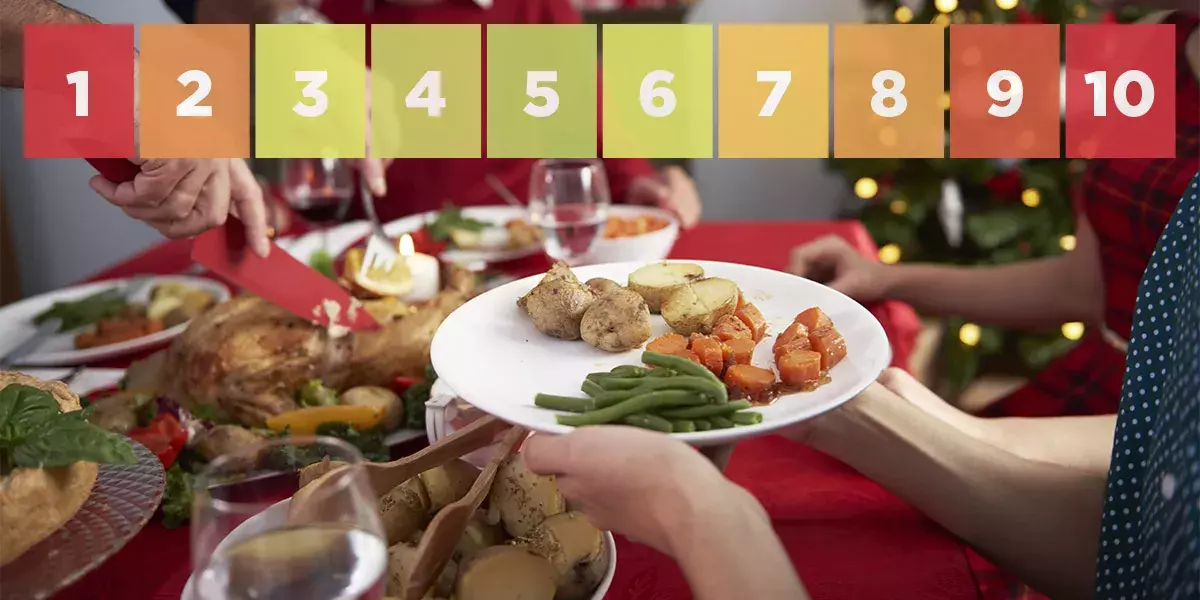
An eater’s intuition
If you're like me, you can hardly believe it's “that” time of year again: the holidays.
The holidays are meant to be a delightful time spent with friends and loved ones over delicious food, conversation, and laughter, but they can also be stressful.
One thing you don't want to stress over during the holidays is your diet. If you feel that familiar sense of dread creeping in at the thought of controlling yourself around the abundance of food, as many people do, then perhaps you should consider a technique known as intuitive eating, a program created by Evelyn Tribole, MS, RDN, and Elyse Resch, MS, RDN, CEDRD, Fiaedp, FADA.

Hunger Scale
- Extreme hunger, starving
- Very hungry
- Hungry
- Some hunger pangs
- Neutral
- Almost satisfied
- Full and satisfied
- Very full
- Stuffed
- So full you feel sick
For a peaceful approach to food this holiday season, follow these 4 intuitive eating concepts:
- Honor your hunger and respect your fullness.
These go hand in hand. When you learn to tune out the subtle signs of hunger, as many of us do, you also tune out signs of fullness. When you become excessively hungry, conscious, moderate eating is nearly impossible. Rather than skipping morning meals to save your calories for the big feast, always eat according to your hunger.
Think of hunger on a scale of 1-10. Check in with yourself before eating and periodically while eating. Try to keep your hunger and fullness level between a 3 and 7. This takes a bit of practice at first, but soon it will come naturally. If you want a second serving of Grandma's delicious stuffing, that's OK! Just check in with yourself first. - Savor your meal without judgment and allow yourself to experience the joy of eating.
In fact, you'll notice that when you do, you will likely be naturally satisfied with less. It is often when we deprive ourselves of our favorite “off-limits” foods that we go overboard. No foods should be off-limits, as this only increases the appeal. Instead, slow down and savor your food; this requires being present and mindful. Too often we are distracted or detached when we eat, which makes it easier to eat more than we need while experiencing less satisfaction. When you are finished eating, take a moment to acknowledge how your food made you feel. - Honor your feelings without using food.
Check in with yourself, asking, “How do I feel?” and “What do I need?” In doing so, you may find that you're in fact not hungry at all. We often use food to comfort, distract, and nurture emotions like anxiety, loneliness, boredom, or anger. But food won't fix any of these problems and will only make you feel worse. Maybe you thought you were hungry for a second piece of pumpkin pie, but in fact you were just tired and needed a little sunshine. Try taking a short walk first. You can still decide to have another piece of pumpkin pie later, but you may find that you no longer want it. - Forgive yourself.
If you do overindulge, forgive yourself. One meal or even one day of overindulging won't cause any major weight gain. Having an all-or-nothing approach to food choices and feeling excessively guilty can, however, as you will be more likely to continue the cycle of overindulging. Instead, learn from your experience and be more mindful next time.
Eating shouldn't be stressful — it should be enjoyable! So be mindful and throw out the rules when it comes to eating. Tune into your innate wisdom; it will give you all the guidance you need to choose the right foods and portions for your unique body so you can enjoy the holiday season without fear or regret.
Chesdin Yeager is a dietetic intern with Morrison Healthcare. She is completing her food service and clinical rotations at Spartanburg Medical Center. Yeager graduated from the University of Florida with a bachelor's degree in Food Science and Human Nutrition. After graduating, she moved to Greenville to work as a WIC nutritionist, providing maternal and childhood nutrition counseling. Yeager has a particular interest in intuitive eating and hopes to counsel individuals who wish to improve their relationship with food.












